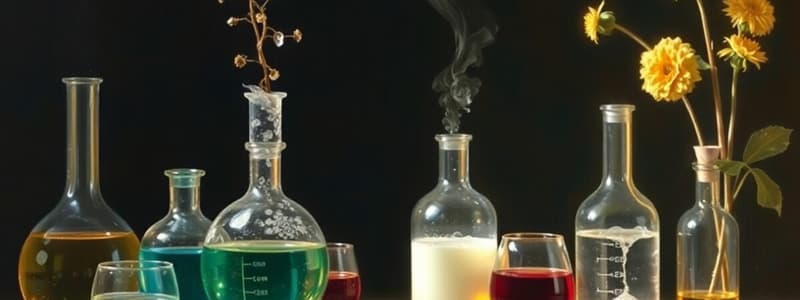Podcast
Questions and Answers
Which branch of chemistry focuses on carbon-containing compounds?
Which branch of chemistry focuses on carbon-containing compounds?
- Analytical Chemistry
- Organic Chemistry (correct)
- Biochemistry
- Inorganic Chemistry
What is the basic building block of matter?
What is the basic building block of matter?
- Element
- Molecule
- Atom (correct)
- Compound
Which type of reaction involves one element replacing another in a compound?
Which type of reaction involves one element replacing another in a compound?
- Single Replacement (correct)
- Decomposition
- Synthesis
- Double Replacement
What does the Law of Conservation of Mass state?
What does the Law of Conservation of Mass state?
Which of the following is measured on a scale of 0 to 14?
Which of the following is measured on a scale of 0 to 14?
What type of chemical bond involves the sharing of electron pairs between atoms?
What type of chemical bond involves the sharing of electron pairs between atoms?
Which of these is NOT a type of chemical reaction?
Which of these is NOT a type of chemical reaction?
What do groups in the periodic table represent?
What do groups in the periodic table represent?
Flashcards are hidden until you start studying
Study Notes
Definition of Chemistry
- The scientific study of matter, its properties, composition, structure, and changes it undergoes during chemical reactions.
Branches of Chemistry
- Organic Chemistry: Study of carbon-containing compounds and their properties.
- Inorganic Chemistry: Focuses on inorganic compounds, typically those not based on carbon-hydrogen bonds.
- Physical Chemistry: Combines principles of physics and chemistry to understand how matter behaves on a molecular and atomic level.
- Analytical Chemistry: Involves techniques and methods used to separate, identify, and quantify matter.
- Biochemistry: Study of chemical processes within and related to living organisms.
Fundamental Concepts
- Atoms: Basic building blocks of matter, composed of protons, neutrons, and electrons.
- Molecules: Groups of atoms bonded together.
- Chemical Bonds: Forces that hold atoms together; includes ionic bonds, covalent bonds, and metallic bonds.
- Elements: Pure substances that cannot be broken down; defined by the number of protons in their nuclei.
- Compounds: Substances formed when two or more elements chemically bond in fixed ratios.
The Periodic Table
- Organizes elements based on atomic number, electron configuration, and recurring chemical properties.
- Groups (columns) indicate elements with similar properties.
- Periods (rows) represent elements with increasing atomic number.
Chemical Reactions
- Processes where reactants transform into products.
- Types of reactions:
- Synthesis: Two or more substances combine to form a new compound.
- Decomposition: A compound breaks down into simpler substances.
- Single Replacement: One element replaces another in a compound.
- Double Replacement: Exchange of ions between two compounds.
- Combustion: Reaction with oxygen to produce heat and light.
Laws of Chemistry
- Law of Conservation of Mass: Mass is neither created nor destroyed in a chemical reaction.
- Law of Definite Proportions: A chemical compound contains the same elements in the same proportions by mass.
- Law of Multiple Proportions: When elements combine in different ratios, they form different compounds.
Key Terms
- Molarity: Concentration of a solution expressed as moles of solute per liter of solution.
- pH: Measure of acidity or alkalinity of a solution, ranging from 0 (acidic) to 14 (basic).
- Catalyst: Substance that increases the rate of a chemical reaction without being consumed.
Laboratory Techniques
- Titration: Method for determining the concentration of a solution.
- Chromatography: Technique for separating mixtures based on component interactions.
- Spectroscopy: Study of the interaction between matter and electromagnetic radiation to identify substances.
Safety in Chemistry
- Always wear appropriate personal protective equipment (PPE).
- Understand and follow Material Safety Data Sheets (MSDS) for chemicals used.
- Be aware of emergency procedures, including the location of safety showers and eyewash stations.
Definition of Chemistry
- Scientific study of matter, including its properties, composition, structure, and the changes occurring during chemical reactions.
Branches of Chemistry
- Organic Chemistry: Focus on carbon-containing compounds and their diverse properties.
- Inorganic Chemistry: Studies inorganic compounds, generally excluding carbon-hydrogen based substances.
- Physical Chemistry: Merges physics with chemistry to explore matter's behavior at molecular and atomic levels.
- Analytical Chemistry: Utilizes various techniques for the separation, identification, and quantification of materials.
- Biochemistry: Examines chemical processes relevant to living organisms.
Fundamental Concepts
- Atoms: Fundamental units of matter, made up of protons, neutrons, and electrons.
- Molecules: Formed by the bonding of two or more atoms.
- Chemical Bonds: Forces that link atoms; includes ionic, covalent, and metallic bonds.
- Elements: Pure substances defined by the number of protons; cannot be decomposed.
- Compounds: Substances created from two or more elements chemically bonded in fixed ratios.
The Periodic Table
- Organizes elements by atomic number and electron configuration, with recurring chemical properties.
- Groups (columns): Contain elements with similar characteristics.
- Periods (rows): Represent elements with increasing atomic numbers.
Chemical Reactions
- Transformations where reactants turn into products.
- Types of reactions:
- Synthesis: Formation of a new compound from two or more substances.
- Decomposition: Breakdown of a compound into simpler substances.
- Single Replacement: An element displaces another in a compound.
- Double Replacement: Exchange of ions between two compounds.
- Combustion: Reaction with oxygen to release heat and light.
Laws of Chemistry
- Law of Conservation of Mass: Mass remains constant; not created or destroyed during reactions.
- Law of Definite Proportions: Compounds maintain consistent elemental proportions by mass.
- Law of Multiple Proportions: Different compounds form when elements combine in varied ratios.
Key Terms
- Molarity: Concentration measured as moles of solute per liter of solution.
- pH: Scale measuring acidity (0) to basicity (14) in solutions.
- Catalyst: Increases reaction rate without being consumed in the process.
Laboratory Techniques
- Titration: Technique to determine solution concentration.
- Chromatography: Separates mixtures based on component interactions.
- Spectroscopy: Studies matter's interaction with electromagnetic radiation for substance identification.
Safety in Chemistry
- Use appropriate personal protective equipment (PPE) at all times.
- Familiarize with Material Safety Data Sheets (MSDS) for all chemicals.
- Know emergency procedures and locations of safety equipment like showers and eyewash stations.
Studying That Suits You
Use AI to generate personalized quizzes and flashcards to suit your learning preferences.




